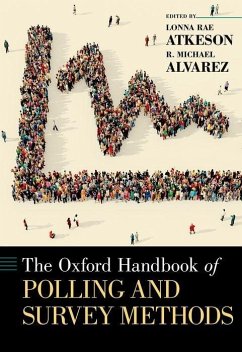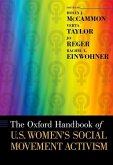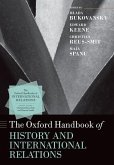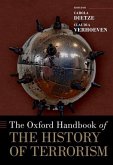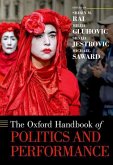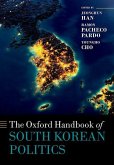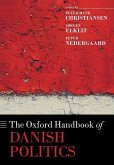The Oxford Handbook of Polling and Survey Methods
Herausgeber: Atkeson, Lonna Rae; Alvarez, R Michael
The Oxford Handbook of Polling and Survey Methods
Herausgeber: Atkeson, Lonna Rae; Alvarez, R Michael
- Gebundenes Buch
- Merkliste
- Auf die Merkliste
- Bewerten Bewerten
- Teilen
- Produkt teilen
- Produkterinnerung
- Produkterinnerung
The Oxford Handbook of Polling and Survey Methods, divided into four main sections, first examines data collection. It then addresses data analysis and the methods available for combining polling data with other types of data and also cover analytic issues, including the new approaches to studying public opinion (for example, social media, the analysis of open-ended questions using text analytic tools, and data imputation. The final section of the Handbook focuses on the presentation of polling results, an area where there is a great deal of innovation.
Andere Kunden interessierten sich auch für
![The Oxford Handbook of U.S. Women's Social Movement Activism The Oxford Handbook of U.S. Women's Social Movement Activism]() The Oxford Handbook of U.S. Women's Social Movement Activism202,99 €
The Oxford Handbook of U.S. Women's Social Movement Activism202,99 €![The Oxford Handbook of History and International Relations The Oxford Handbook of History and International Relations]() The Oxford Handbook of History and International Relations202,99 €
The Oxford Handbook of History and International Relations202,99 €![Oxford Handbook of the History of Terrorism Oxford Handbook of the History of Terrorism]() Carola DietzeOxford Handbook of the History of Terrorism236,99 €
Carola DietzeOxford Handbook of the History of Terrorism236,99 €![The Oxford Handbook of Politics and Performance The Oxford Handbook of Politics and Performance]() The Oxford Handbook of Politics and Performance236,99 €
The Oxford Handbook of Politics and Performance236,99 €![The Oxford Handbook of Historical Political Economy The Oxford Handbook of Historical Political Economy]() The Oxford Handbook of Historical Political Economy219,99 €
The Oxford Handbook of Historical Political Economy219,99 €![The Oxford Handbook of South Korean Politics The Oxford Handbook of South Korean Politics]() The Oxford Handbook of South Korean Politics215,99 €
The Oxford Handbook of South Korean Politics215,99 €![The Oxford Handbook of Danish Politics The Oxford Handbook of Danish Politics]() The Oxford Handbook of Danish Politics210,99 €
The Oxford Handbook of Danish Politics210,99 €-
-
-
The Oxford Handbook of Polling and Survey Methods, divided into four main sections, first examines data collection. It then addresses data analysis and the methods available for combining polling data with other types of data and also cover analytic issues, including the new approaches to studying public opinion (for example, social media, the analysis of open-ended questions using text analytic tools, and data imputation. The final section of the Handbook focuses on the presentation of polling results, an area where there is a great deal of innovation.
Hinweis: Dieser Artikel kann nur an eine deutsche Lieferadresse ausgeliefert werden.
Hinweis: Dieser Artikel kann nur an eine deutsche Lieferadresse ausgeliefert werden.
Produktdetails
- Produktdetails
- Verlag: Hurst & Co.
- Seitenzahl: 672
- Erscheinungstermin: 22. August 2018
- Englisch
- Abmessung: 249mm x 183mm x 53mm
- Gewicht: 1220g
- ISBN-13: 9780190213299
- ISBN-10: 0190213299
- Artikelnr.: 52639377
- Herstellerkennzeichnung
- Libri GmbH
- Europaallee 1
- 36244 Bad Hersfeld
- gpsr@libri.de
- Verlag: Hurst & Co.
- Seitenzahl: 672
- Erscheinungstermin: 22. August 2018
- Englisch
- Abmessung: 249mm x 183mm x 53mm
- Gewicht: 1220g
- ISBN-13: 9780190213299
- ISBN-10: 0190213299
- Artikelnr.: 52639377
- Herstellerkennzeichnung
- Libri GmbH
- Europaallee 1
- 36244 Bad Hersfeld
- gpsr@libri.de
Lonna Rae Atkeson is a Professor of Political Science, Regents' Lecturer, and Directs the Center for the Study of Voting, Elections and Democracy as well as the Institute of Social Research at the University of New Mexico. She is an internationally recognized expert in the area of election sciences, survey methodology, voting rights, election administration, public opinion, and political behavior. Her research has been supported by the National Science Foundation, Pew Charitable Trusts, the Golisano Foundation, the Thornburg Foundation, and local, and state government agencies. She has received various awards for her research in election sciences and for her teaching and mentoring. R.Michael Alvarez has taught at the California Institute of Technology his entire career, focusing on elections, voting behavior, election technology, and research methodologies. Alvarez is a Fellow of the Society for Political Methodology, co-editor of the journal Political Analysis, and co-director of the Caltech/MIT Voting Technology Project. He has received awards for his teaching and mentoring, including twice receiving the Caltech Graduate Student Council's Teaching & Mentoring Award.
* Introduction
* 1. Survey Design
* Total Survey Error
* Herb Weisberg
* Longitudinal Surveys: Issues and Opportunities
* Sunshine Hillygus and Steve Snell
* The Advantages and Disadvantages of Mode
* Lonna Atkeson and Alex Adams
* Taking the Study of Political Behavior Online
* Stephen Ansolabehere and Brian Shaffner
* Sampling for Studying Context: Traditional Surveys and New Directions
* James Gimpel
* Questionnaire Science
* Daniel Oberski
* 2. Data Collection
* Exit Polling Today and What the Future May Hold
* Anthony Salvanto
* Sampling Hard to Reach Populations: Lessons from Sampling Internally
Displaced Persons (IDPs)
* Prakash Adkihari and Lisa Bryant
* Reaching Beyond Low-Hanging Fruit: Surveying Low-Incidence
Populations, Justinlamazoo College
* Youssef Chouhound and Jane Junn
* Survey Research in the Arab World
* Lindsay Benstead
* The Language-Opinion Connection
* Efren O. Perez
* 3. Analysis and presentation
* Causal Inference with Complex Survey Designs: Generating Population
Estimates Using Survey Weights
* Ines Levin and Betsy Sinclair
* Cross-National Surveys and the Comparative Study of Electoral Systems
* Jeffrey A. Karp and Jack Vowles
* Aggregating Survey Data to Estimate Subnational Public Opinion
* Paul Brace
* Public Opinion at the State and Local Level
* Chris Warshaw
* Using Graphical Displays for Presenting Polling Data and Analytic
Results
* William Jacoby and Saundra Schneider
* Graphical Visualization of Polling Results
* Susanna Makela, Yajuan Si, and Andrew Gelman
* Measuring Group Consciousness: Actions Speak Louder than Words
* Kim Proctor
* Issues in Polling Methodologies: Inference and Uncertainty
* Jeff Gill and Jonathan Homola
* 4. New frontiers
* Survey Experiments: Managing the Methodological Costs and Benefits
* Yanna Krupnikov and Blake Findley
* Using Qualitative Methods in a Quantitative Survey Research Agenda
* Kinsey Gimbel and Jocelyn Newsome
* Integration of Contextual Data: Challenges and Opportunities
* Armando Razo
* Twitter and Measuring Public Opinion
* Jonathan Nagler et al.
* Expert Surveys as a Measurement Tool
* Cherie Maestas
* The Rise of Poll Aggregation and Election Forecasting
* Natalie Jackson
* 1. Survey Design
* Total Survey Error
* Herb Weisberg
* Longitudinal Surveys: Issues and Opportunities
* Sunshine Hillygus and Steve Snell
* The Advantages and Disadvantages of Mode
* Lonna Atkeson and Alex Adams
* Taking the Study of Political Behavior Online
* Stephen Ansolabehere and Brian Shaffner
* Sampling for Studying Context: Traditional Surveys and New Directions
* James Gimpel
* Questionnaire Science
* Daniel Oberski
* 2. Data Collection
* Exit Polling Today and What the Future May Hold
* Anthony Salvanto
* Sampling Hard to Reach Populations: Lessons from Sampling Internally
Displaced Persons (IDPs)
* Prakash Adkihari and Lisa Bryant
* Reaching Beyond Low-Hanging Fruit: Surveying Low-Incidence
Populations, Justinlamazoo College
* Youssef Chouhound and Jane Junn
* Survey Research in the Arab World
* Lindsay Benstead
* The Language-Opinion Connection
* Efren O. Perez
* 3. Analysis and presentation
* Causal Inference with Complex Survey Designs: Generating Population
Estimates Using Survey Weights
* Ines Levin and Betsy Sinclair
* Cross-National Surveys and the Comparative Study of Electoral Systems
* Jeffrey A. Karp and Jack Vowles
* Aggregating Survey Data to Estimate Subnational Public Opinion
* Paul Brace
* Public Opinion at the State and Local Level
* Chris Warshaw
* Using Graphical Displays for Presenting Polling Data and Analytic
Results
* William Jacoby and Saundra Schneider
* Graphical Visualization of Polling Results
* Susanna Makela, Yajuan Si, and Andrew Gelman
* Measuring Group Consciousness: Actions Speak Louder than Words
* Kim Proctor
* Issues in Polling Methodologies: Inference and Uncertainty
* Jeff Gill and Jonathan Homola
* 4. New frontiers
* Survey Experiments: Managing the Methodological Costs and Benefits
* Yanna Krupnikov and Blake Findley
* Using Qualitative Methods in a Quantitative Survey Research Agenda
* Kinsey Gimbel and Jocelyn Newsome
* Integration of Contextual Data: Challenges and Opportunities
* Armando Razo
* Twitter and Measuring Public Opinion
* Jonathan Nagler et al.
* Expert Surveys as a Measurement Tool
* Cherie Maestas
* The Rise of Poll Aggregation and Election Forecasting
* Natalie Jackson
* Introduction
* 1. Survey Design
* Total Survey Error
* Herb Weisberg
* Longitudinal Surveys: Issues and Opportunities
* Sunshine Hillygus and Steve Snell
* The Advantages and Disadvantages of Mode
* Lonna Atkeson and Alex Adams
* Taking the Study of Political Behavior Online
* Stephen Ansolabehere and Brian Shaffner
* Sampling for Studying Context: Traditional Surveys and New Directions
* James Gimpel
* Questionnaire Science
* Daniel Oberski
* 2. Data Collection
* Exit Polling Today and What the Future May Hold
* Anthony Salvanto
* Sampling Hard to Reach Populations: Lessons from Sampling Internally
Displaced Persons (IDPs)
* Prakash Adkihari and Lisa Bryant
* Reaching Beyond Low-Hanging Fruit: Surveying Low-Incidence
Populations, Justinlamazoo College
* Youssef Chouhound and Jane Junn
* Survey Research in the Arab World
* Lindsay Benstead
* The Language-Opinion Connection
* Efren O. Perez
* 3. Analysis and presentation
* Causal Inference with Complex Survey Designs: Generating Population
Estimates Using Survey Weights
* Ines Levin and Betsy Sinclair
* Cross-National Surveys and the Comparative Study of Electoral Systems
* Jeffrey A. Karp and Jack Vowles
* Aggregating Survey Data to Estimate Subnational Public Opinion
* Paul Brace
* Public Opinion at the State and Local Level
* Chris Warshaw
* Using Graphical Displays for Presenting Polling Data and Analytic
Results
* William Jacoby and Saundra Schneider
* Graphical Visualization of Polling Results
* Susanna Makela, Yajuan Si, and Andrew Gelman
* Measuring Group Consciousness: Actions Speak Louder than Words
* Kim Proctor
* Issues in Polling Methodologies: Inference and Uncertainty
* Jeff Gill and Jonathan Homola
* 4. New frontiers
* Survey Experiments: Managing the Methodological Costs and Benefits
* Yanna Krupnikov and Blake Findley
* Using Qualitative Methods in a Quantitative Survey Research Agenda
* Kinsey Gimbel and Jocelyn Newsome
* Integration of Contextual Data: Challenges and Opportunities
* Armando Razo
* Twitter and Measuring Public Opinion
* Jonathan Nagler et al.
* Expert Surveys as a Measurement Tool
* Cherie Maestas
* The Rise of Poll Aggregation and Election Forecasting
* Natalie Jackson
* 1. Survey Design
* Total Survey Error
* Herb Weisberg
* Longitudinal Surveys: Issues and Opportunities
* Sunshine Hillygus and Steve Snell
* The Advantages and Disadvantages of Mode
* Lonna Atkeson and Alex Adams
* Taking the Study of Political Behavior Online
* Stephen Ansolabehere and Brian Shaffner
* Sampling for Studying Context: Traditional Surveys and New Directions
* James Gimpel
* Questionnaire Science
* Daniel Oberski
* 2. Data Collection
* Exit Polling Today and What the Future May Hold
* Anthony Salvanto
* Sampling Hard to Reach Populations: Lessons from Sampling Internally
Displaced Persons (IDPs)
* Prakash Adkihari and Lisa Bryant
* Reaching Beyond Low-Hanging Fruit: Surveying Low-Incidence
Populations, Justinlamazoo College
* Youssef Chouhound and Jane Junn
* Survey Research in the Arab World
* Lindsay Benstead
* The Language-Opinion Connection
* Efren O. Perez
* 3. Analysis and presentation
* Causal Inference with Complex Survey Designs: Generating Population
Estimates Using Survey Weights
* Ines Levin and Betsy Sinclair
* Cross-National Surveys and the Comparative Study of Electoral Systems
* Jeffrey A. Karp and Jack Vowles
* Aggregating Survey Data to Estimate Subnational Public Opinion
* Paul Brace
* Public Opinion at the State and Local Level
* Chris Warshaw
* Using Graphical Displays for Presenting Polling Data and Analytic
Results
* William Jacoby and Saundra Schneider
* Graphical Visualization of Polling Results
* Susanna Makela, Yajuan Si, and Andrew Gelman
* Measuring Group Consciousness: Actions Speak Louder than Words
* Kim Proctor
* Issues in Polling Methodologies: Inference and Uncertainty
* Jeff Gill and Jonathan Homola
* 4. New frontiers
* Survey Experiments: Managing the Methodological Costs and Benefits
* Yanna Krupnikov and Blake Findley
* Using Qualitative Methods in a Quantitative Survey Research Agenda
* Kinsey Gimbel and Jocelyn Newsome
* Integration of Contextual Data: Challenges and Opportunities
* Armando Razo
* Twitter and Measuring Public Opinion
* Jonathan Nagler et al.
* Expert Surveys as a Measurement Tool
* Cherie Maestas
* The Rise of Poll Aggregation and Election Forecasting
* Natalie Jackson

